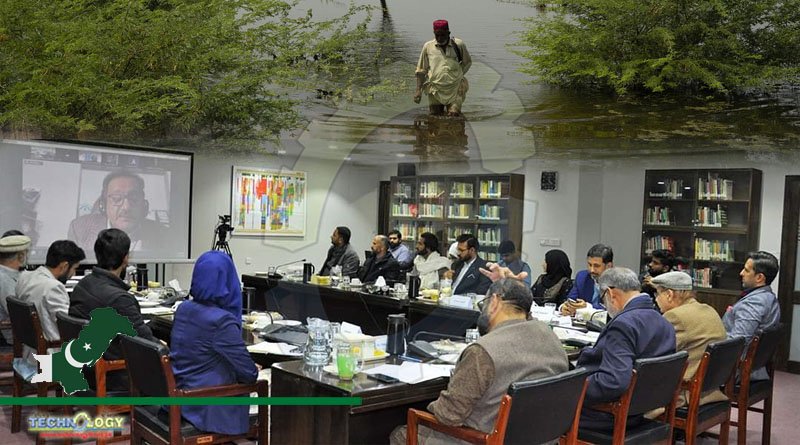Prior to COP27, Pakistan’s own environmental governance structure must be fully operationalized in order to seek assistance through international climate financing.

The Climate Change Authority of Pakistan should be established as soon as possible because mitigating climate change disasters and seeking climate financing and compensation from the international community necessitate comprehensive policy, legislative, and governance mechanisms at all levels of government.
Prior to COP27, Pakistan’s own environmental governance structure must be fully operationalized in order to seek assistance through international climate financing, particularly the “loss and damage” fund.
The long-awaited Climate Change Authority was demanded during a dialogue organised by the Institute of Policy Studies (IPS) titled “Post COP27 Strategy for Pakistan: Climate Financing and De-carbonization” to deliberate on necessary mitigation and adaptation measures to address the climate change crisis following the 27th UN climate change conference held in November in Egypt.
The session was chaired by Mirza Hamid Hassan, chairperson of the IPS Steering Committee on Energy, Water, and Climate Change and former federal secretary of the Ministry of Water and Power, and speakers included Khalid Rahman, chairman of the IPS, and Dr. Muhammad Irfan Khan, dean of Environmental Sciences at the International Islamic University Islamabad (IIUI),Syeda Hadika Jamshaid, climate policy specialist, Ministry of Climate Change, Syed Aqeel Hussain Jafri, director, Policy and International Cooperation, Alternative Energy Development Board, Dr. Shafqat Munir Ahmed, director, Resilient Development Program, SDPI, Dr. Kanwar Muhammad Javed Iqbal, general secretary, Pakistan Panel for Climate Change (PPCC), and Lubna Riaz, researcher, IPS.
Despite the passage of the Climate Change Act of 2017, the formation of the Climate Change Authority and Climate Change Council appears to be a difficult task, according to the experts. They believed that the Council of Common Interests (CCI) and other relevant organisations should prioritise this critical national issue.
The speakers acknowledged Pakistan’s advocacy and role at COP27 in making the international community, particularly the developed world, realise the disastrous consequences of climate change and the need for loss and damage financing for vulnerable countries.
This realisation represents active progress toward the cause; however, Pakistan must take decisive national actions as well, because whatever climate compensation is provided, it will not ensure future security against climate-induced afflictions, according to the speakers. With an increasing poverty rate and poor human development, this has become especially important because Pakistan will remain vulnerable in the future.
They advised that, as part of future-oriented solutions to the crises caused by climate change, it is critical to adopt green measures within society as well as corporate sectors, as well as develop indigenous mechanisms and legislation.
Furthermore, experts estimate that the primary recovery costs, including reconstruction and social development, will be $16 billion, while secondary recovery costs, such as medical care and food supply, will exceed this figure. As a result, climate financing alone will not suffice.
While highlighting the de-carbonization strategy, the speakers maintained that Pakistan has already demonstrated its responsibility by committing to decarbonizing the power sector through a renewable energy transition and aiming for a 60% share of non-fossil fuel-based power generation by the end of this decade.
Though such adaptation measures to climate change impacts are a basic requirement, mitigation measures are equally important in order to prepare for the future. The speakers also stressed the importance of reforming the policy, legal, and institutional frameworks for better environmental governance, which is also required for the efficient distribution of climate finance in the country.
Because Pakistan will remain vulnerable in the future, stakeholders must continue to negotiate, lobby, and advocate for the cause at the international level in every capacity possible.
In this regard, the experts stressed the importance of establishing a climate authority to ensure proper management of funds through appropriate strategies. These disaster recovery strategies can be quantified into short-, medium-, and long-term initiatives.
Furthermore, the dissection of the losses from the climate disaster for the distribution of funds should be based on accurate data on life causalities, monetary loss, food scarcity, and medication needs in disaster-affected areas.
In closing the session, Khalid Rahman stated that every stakeholder must increase their efforts to mitigate climate-induced vulnerability and disasters. Furthermore, there is an urgent need to strengthen climate change governance and resilience to climatic threats in order to advance the successful outcomes of efforts against climate-related damages.
He went on to say that the international development paradigm is beset by a conundrum in which states want to address climate change and its consequences while also pursuing growth-led production, which is inherently the cause of climate change. This dilemma of the international development paradigm should be challenged and made a priority in climate change discourses and efforts.
